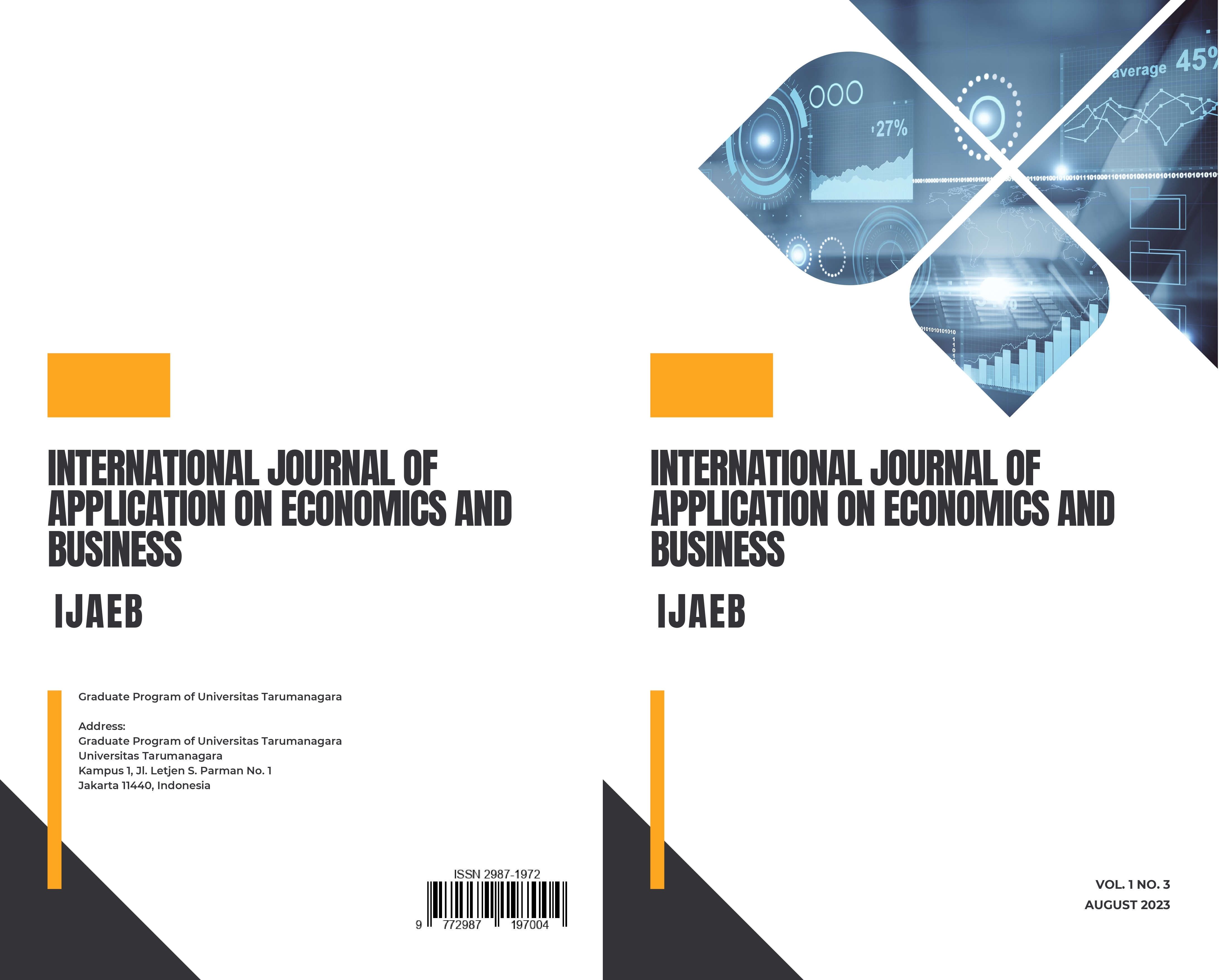TESTING THE EFFECT OF SUBJECTIVE NORM MODERATION ON LUXURY PRODUCTS
Main Article Content
Abstract
The aim of this research is to examine the moderating role of subjective norm values. This study uses primary data with the target population being consumers who wish to purchase luxury products in the next year in Jakarta. The data collection process was carried out by distributing questionnaires online through the media google form. The sample collection method uses non-probability sampling with purposive sampling with 200 respondents. The data analysis technique used is Structural Equation Modeling (SEM) with SmartPLS software version 3.2.9. The results of this study found that attitudes, subjective norms and perceptions of behavioral control influence purchase intention and attitudes toward purchase intentions with moderation of subjective norms but perceptions of behavioral control on buying interest with moderation of subjective norms have no effect.
Article Details
Section

This work is licensed under a Creative Commons Attribution-NonCommercial-ShareAlike 4.0 International License.
This journal provides immediate open access to its content on the principle that making research freely available to the public supports a greater global exchange of knowledge.
IJAEB by Graduate Program of Universitas Tarumanagara is licensed under a Creative Commons Attribution-NonCommercial-ShareAlike 4.0 International License.. Permissions beyond the scope of this license may be available at https://journal.untar.ac.id/index.php/ijaeb
References
Jain, S., Khan, M.N. and Mishra, S. (2015), Factors affecting luxury purchase intention: a conceptual framework based on an extension of the theory of planned behavior”, South Asian Journal of Management, Vol. 22 No. 4, pp. 136-163.
Ren, Chen, Biggins, & Rebecca. (2017). Understanding luxury brand purchases by millennials through application of generational cohort theory. In: Academy of Marketing Conference 2017. Research at the University of York St John, 1–8.
Tunjungsari, H. K., Syahrivar, J., & Chairy, C. (2020). Brand loyalty as mediator of brand image-repurchase intention relationship of premium-priced, high-tech product in Indonesia. Jurnal Manajemen Maranatha, 20(1), 21–30. https://doi.org/10.28932/jmm. v20i1.2815
Stein, J. and Sanburn, J. (2013), “The New Greatest Generation”, Time International (Atlantic Edition), Vol. 181 No. 19, pp. 26-33.
Loroz, P. S., & Helgeson, J. G. (2013). Boomers and their Babies: An Exploratory Study Comparing Psychological Profiles and Advertising Appeal Effectiveness Across Two Generations. Journal of Marketing Theory and Practice, 21(3), 289–306. https://doi.org/ 10.2753/MTP1069-6679210304
Jain, S. (2019). Factors Affecting Sustainable Luxury Purchase Behavior: A Conceptual Framework. Journal of International Consumer Marketing, 31(2), 130–146. https://doi. org/10.1080/08961530.2018.1498758
Wu, M., Chaney, I., Chen, C., Nguyen, B. and Melewar, T.C. (2015), Luxury fashion brands: factors role influencing young female consumers’ luxury fashion purchasing in Taiwan, Qualitative Market Research: An International Journal, Vol. 18 No. 3, pp. 298-319. https://doi.org/10.1108/QMR-02-2014-0016
Jain, S. (2020). Assessing the moderating effect of subjective norm on luxury purchase intention: a study of Gen Y consumers in India. International Journal of Retail & Distribution Management, 48(5), 517–536. https://doi.org/10.1108/IJRDM-02-2019-0042
Jain, S., Khan, M. N., & Mishra, S. (2017). Understanding consumer behavior regarding luxury fashion goods in India based on the theory of planned behavior. Journal of Asia Business Studies, 11(1), 4–21. https://doi.org/10.1108/JABS-08-2015-0118
Jin, B., & Hye Kang, J. (2011). Purchase intention of Chinese consumers toward a US apparel brand: a test of a composite behavior intention model. Journal of Consumer Marketing, 28(3), 187–199. https://doi.org/10.1108/07363761111127617
Kotler and Keller. (2016). Manajemen Pemasaran Edisi 15. Jakarta: Erlangga.
Arora, A. P., & Kishor, K. (2019). Factors Determining Purchase Intenton and Behaviour of Consumers Towards Luxury Fashion Brands in India: An Impirical Evidence. British Journal of Marketing Studies, Vol. 7(Issue 4, pp.34–58), 1–25.
Kim, H., & Karpova, E. (2010). Consumer Attitudes Toward Fashion Counterfeits: Application of the Theory of Planned Behavior. Clothing and Textiles Research Journal, 28(2), 79–94. https://doi.org/10.1177/0887302X09332513
(Ling, 2009). Understanding Consumer Purchasing Behavior Regarding Luxury Fashion-Related Goods in China. Ph.D. Thesis, Hong Kong Polytechnic University. https://theses.lib.polyu.edu.hk/handle/200/4531
Lee, E., M. Edwards, S., Youn, S., & Yun, T. (2018). Understanding the moderating effect of motivational values on young consumers’ responses to luxury brands: A cross-cultural study of South Korea and the USA. Journal of Marketing Communications, 24(2), 103–124. https://doi.org/10.1080/13527266.2014.975830
Al-Swidi, A., Mohammed Rafiul Huque, S., Haroon Hafeez, M., & Noor Mohd Shariff, M. (2014). The role of subjective norms in theory of planned behavior in the context of organic food consumption. British Food Journal, 116(10), 1561–1580. https://doi.org/ 10.1108/BFJ-05-2013-0105
Povey, R., Conner, M., Sparks, P., James, R., & Shepherd, R. (2000). The theory of planned behaviour and healthy eating: Examining additive and moderating effects of social influence variables. Psychology & Health, 14(6), 991–1006. https://doi.org/10. 1080/08870440008407363

